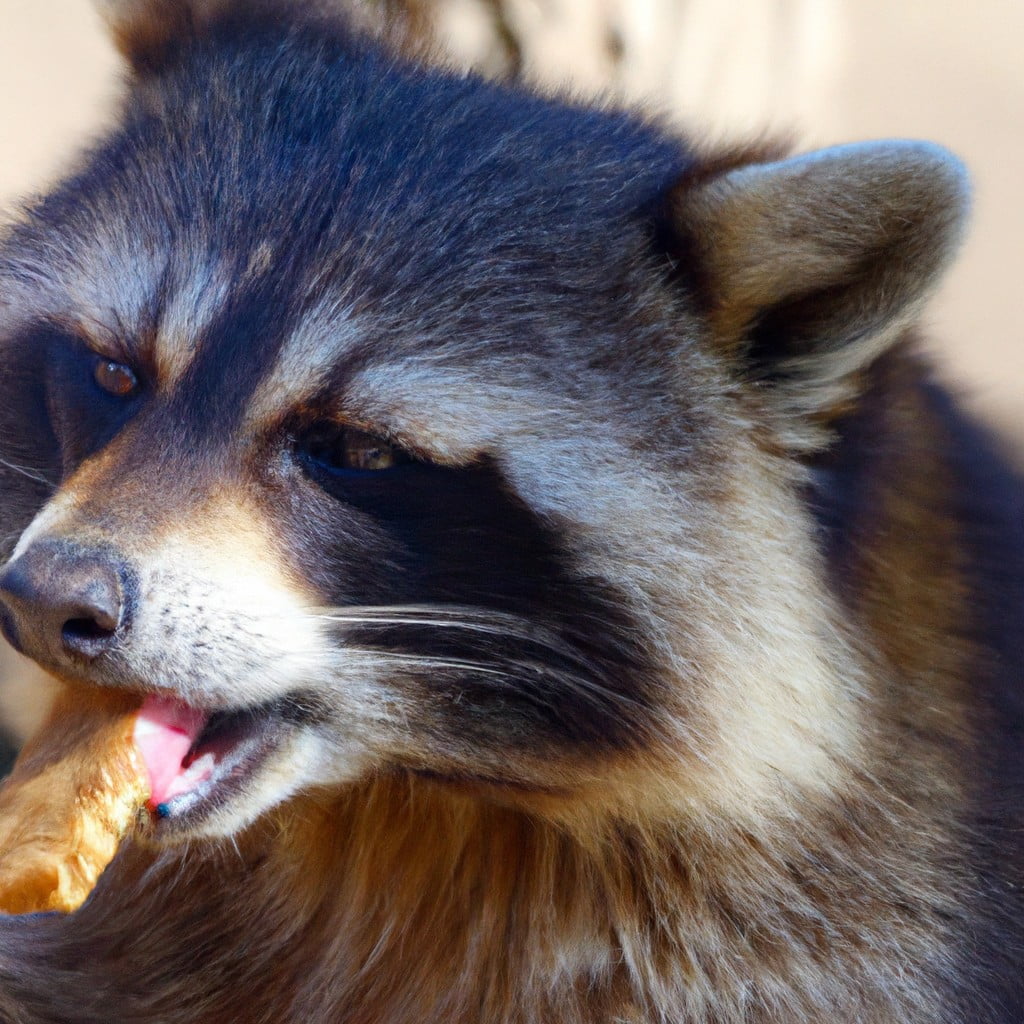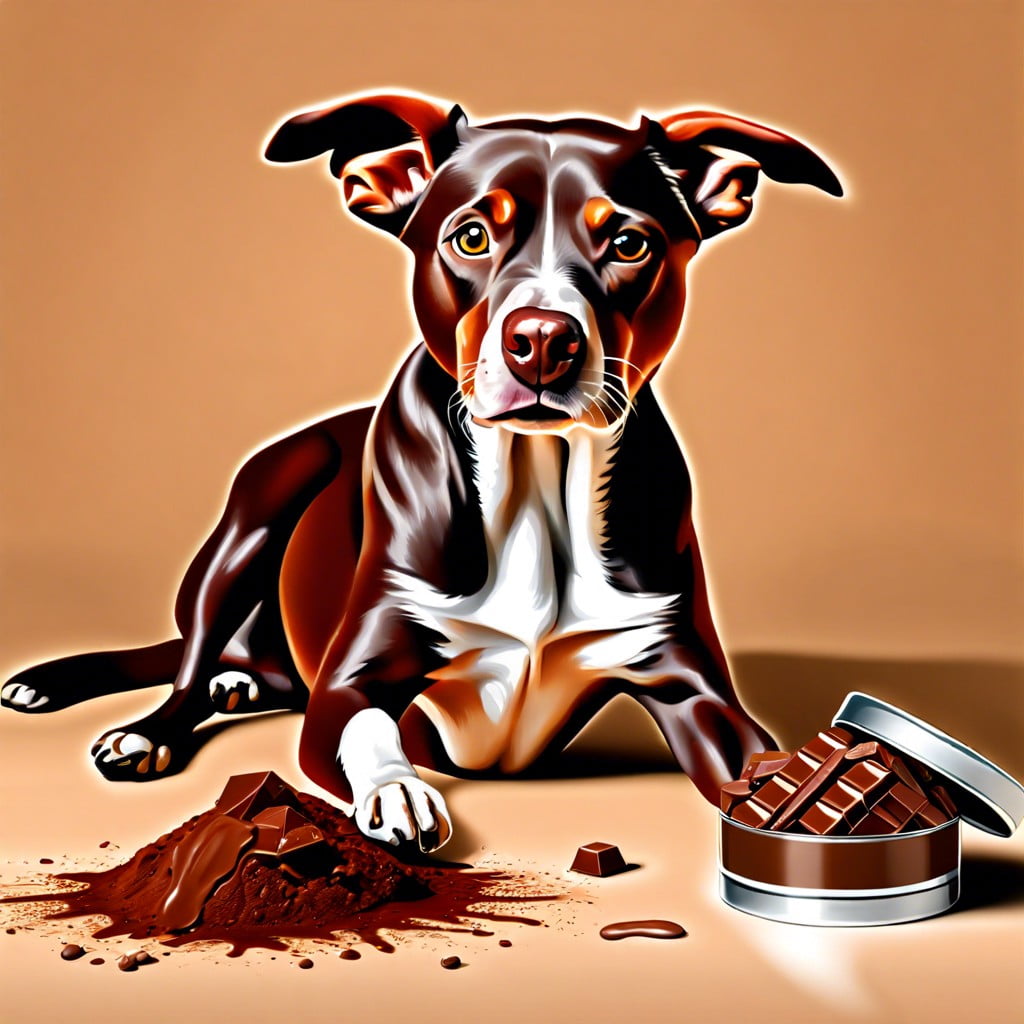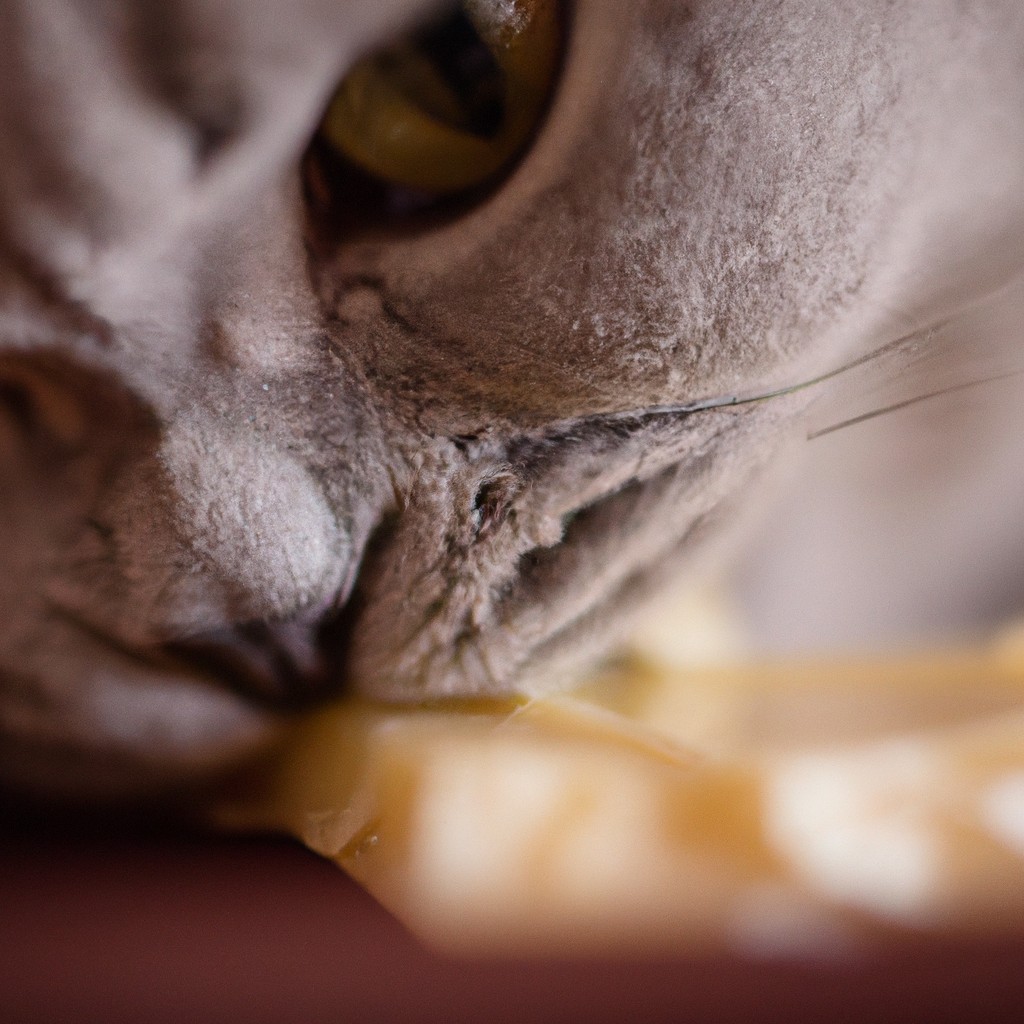No, raccoons should not eat chocolate as it contains theobromine, which is toxic to many animals including raccoons.
While chocolate might be a delightful treat for humans, it’s not suitable for raccoons. The key ingredient in chocolate, theobromine, is toxic to many animals, including raccoons.
Even a small amount can lead to severe health problems, such as heart failure, seizures, and in extreme cases, death.
So, it’s essential to keep your chocolate stash well away from curious raccoon paws.
This article will delve deeper into the reasons why chocolate is dangerous for raccoons and offer tips on what to do if a raccoon accidentally ingests chocolate.
Key takeaways:
- Chocolate is toxic to raccoons due to theobromine content.
- Small amounts of chocolate can cause severe health problems in raccoons.
- Different types of chocolate have varying levels of toxicity for raccoons.
- Symptoms of chocolate poisoning in raccoons include hyperactivity, seizures, and irregular heartbeat.
- Preventing raccoons from accessing chocolate is crucial for their health.
Inside
Chocolate’s Effect On Raccoons

When consumed by raccoons, chocolate can lead to severe health issues due to the presence of a compound called theobromine, typically tolerated by humans but harmful to many animals. Raccoons are primarily affected in the following ways:
- Gastrointestinal problems: Theobromine causes upset stomach, including vomiting and diarrhoea, leading to dehydration in raccoons.
- Nervous system complications: Overconsumption leads to hyperactivity, restlessness, and twitching.
- Cardiac issues: More severe side effects include elevated heart rate and abnormal rhythms.
Interestingly, the negative effects of chocolate don’t stop raccoons from enjoying its flavor, which can lead to overconsumption if chocolate is accessible to them. It also has a high-fat content that attracts these creatures.
Steps to mitigate these issues include:
- Sealing chocolate products: Ensure that your household supplies are not easily accessible to these creatures.
- Safeguarding garbage cans: Raccoons are known to rummage through trash in search of food; hence, secure the lid to prevent them from gaining access.
- Educating others: Make your neighbours aware of the harmful effects that chocolate can have on raccoons.
In essence, understanding the effects of chocolate consumption by raccoons can help prevent these creatures from experiencing unnecessary harm due to theobromine toxicity.
Types of Chocolate and Their Danger to Raccoons
Different types of chocolate carry varying contents of theobromine, a substance toxic to raccoons.
The most dangerous type is dark chocolate, particularly baking or gourmet chocolate. It contains the highest concentration of theobromine and is, therefore, the most toxic.
Milk chocolate is the next type. Despite having less theobromine than dark chocolate, it is still capable of causing harm to raccoons.
White chocolate is the least harmful among these types. It contains minimal amounts of theobromine due to its lack of cocoa solids. However, the sugar and fats in it can still have negative health effects on raccoons.
Even small amounts of these chocolates can cause health problems in raccoons. It is crucial to avoid sharing them with raccoons and to keep storage areas secured from these curious creatures.
How the Quantity of Chocolate Influences Its Danger to Raccoons
The quantity of chocolate consumed by a raccoon can highly influence its health effects. When dealing with types of chocolate that contain high levels of caffeine and theobromine such as dark chocolate, the hazards skyrocket even when only a small amount is ingested. The smaller the raccoon, the more pronounced the damage due to lower body mass distributing these harmful chemical compounds.
If a raccoon consumes a piece of milk chocolate, which has less of these dangerous substances, the impact might not be immediately noticeable but can still be dangerous in the long run. It’s important, however, not to be complacent as repeated exposure, even to lower concentrations of toxic elements, can lead to cumulative damage in the raccoon’s system.
While it might seem that white chocolate, with its negligible levels of theobromine and caffeine, would be safe, it’s still not advisable for raccoons. The high sugar content is detrimental to their health, which isn’t adapted to handle such processed foods.
Following steps can be helpful in ensuring raccoons are not exposed to dangerous doses of chocolate:
- Properly secure bins and trash cans to prevent raccoons from rummaging through them
- Store high-risk foods such as chocolate in cupboards or other confined spaces raccoons cannot access
- Invest in raccoon-proof feeders if you put out food for birds or other wildlife
- Avoid using cocoa mulch in your garden, as it can be just as harmful as chocolate
- Consider humane raccoon deterrents to encourage the creatures to seek out more suitable, natural diets elsewhere
Identifying Symptoms of Chocolate Poisoning in Raccoons
Recognizing the signs of chocolate toxicity in raccoons is important for immediate action. Unusual symptoms may include hyperactivity or restlessness, an early warning sign. Excessive panting, drooling, and vomiting may also occur, signaling the raccoon’s body is in distress from the ingested chocolate. More severe signs are irregular heartbeat and seizures, which requires immediate attention.
Controlling the raccoon’s access to chocolate is crucial once these signs are recognized. If a raccoon is seen consuming chocolate, remove any remaining edibles and monitor their health closely. Contacting a local wildlife authority or vet for guidance on how to handle a raccoon affected by chocolate toxicity is highly advisable. Chocolate, specifically dark and baking chocolate, should always be kept out of reach from raccoons.
Monitoring raccoons is essential, especially during the night when they are most active. Deterring them from areas where chocolate may be available reduces the risk. Implementing secure garbage lids or storing food indoors can help prevent potential poisoning scenarios.
Raccoon’s Affection for Chocolate
Despite their cute appearance, these critters are notorious scavengers, rummaging through garbage bins in search of a quick snack. Their diverse diet makes them prone to trying new tastes, and chocolate is no exception.
While not the primary food source, it’s hard for raccoons to resist the sweet temptation of chocolate. Be it from discarded candy wrappers or unattended chocolate treats, raccoons have frequently been caught indulging in these rich desserts.
Inherent curiosity paired with a powerful sense of smell draws raccoons towards sweets. Chocolate, with its strong scent, easily captures their olfactory interest.
Raccoons, having quick metabolisms, gravitate towards high-calorie snacks. Chocolate, chock-full of fats and sugars, meets this preference, further increasing their attraction towards it.
Raccoons are skilled climbers, furthering their chances of encountering chocolate. Elevated places such as kitchen counters or picnic tables are no barrier to these agile mammals, adding to the potential of finding these tantalizing treats.
Quick tips to help minimize raccoon’s access to chocolate:
- Keep all food, especially chocolate, sealed and put away.
- Trash cans should be sealed, locked, or placed in an inaccessible location.
- Oddly enough, spreading a bit of hot sauce on the chocolate can deter raccoons; they may love sweets but despise spicy food.
Potential Consequences of a Raccoon Eating Chocolate
When a raccoon consumes chocolate, several serious health issues can arise due to the presence of theobromine, a stimulant that raccoons cannot metabolize efficiently.
Rapid heart rate is a prevalent consequence. The theobromine found in chocolate can cause a raccoon’s heart to beat at an alarmingly high pace. Over time, this can lead to heart damage or failure.
Digestive issues such as vomiting, diarrhea, and abdominal discomfort can also occur. These symptoms are the raccoon’s body’s way of ridding itself of the harmful substance.
Central nervous system complications can also arise. Theobromine is a powerful stimulant that can lead to restlessness, hyperactivity, and even seizures in raccoons.
Meanwhile, prolonged exposure to chocolate, especially in large amounts, can eventually lead to a fatal case of theobromine poisoning. The onset of this condition can be sudden and devastating, causing severe internal damage in the raccoon’s body.
Avoid feeding raccoons chocolate and consider the use of wildlife-friendly deterrents to discourage these creatures from raiding your chocolate stash. If you notice a raccoon exhibiting unusual symptoms, contact a local wildlife agency or a veterinarian specializing in wildlife. It’s essential not to attempt treating the raccoon on your own as it can be dangerous for both you and the animal.
Strategies to Prevent Raccoons From Eating Chocolate
Keep chocolate and any food waste containing chocolate securely locked away. Raccoon-proof bins are available and are highly effective at keeping these curious creatures out.
Place chocolate and cocoa plants out of reach. If you enjoy growing cacao trees indoors or enjoy having chocolate bars during camping trips, ensure these are kept in areas raccoons can’t easily access.
Train pets not to eat chocolate. Dogs might drop chocolate they can’t finish, attracting raccoons, so train them to steer clear of this treat.
Limit the availability of water near your home. Raccoons are known to like washing their food in water before eating it.
Never intentionally feed them chocolate. Raccoons can be cute, but feeding them is not beneficial for you or them.
Use repellents designed to deter raccoons. There are many humane and eco-friendly options available on the market.
Encourage the raccoons to relocate. If raccoons are a regular problem, it could be worth investing in a method to encourage them to live elsewhere, such as installing a raccoon-proof bird feeder.
Use fencing around your property. Raccoons are excellent climbers, so consider electric or raccoon-proof fencing.
Speaking of fencing, let’s remember to keep our cocoa plants well-protected indoors, too. Raccoons can still manage to find ways into our homes, but a good home security plan can keep your indoor plants safe from these masked bandits.
Can Raccoons Consume Chocolate Cookies?
Chocolate cookies can pose a significant danger to raccoons due to their content of chocolate, sugar, and other ingredients potentially harmful to a raccoon’s health. Despite their scavenger nature, feeding these sweet treats to raccoons can have adverse effects.
- Chocolate’s chief toxin, theobromine, is found in the cookies just as in pure chocolate, causing harmful effects on the raccoon’s heart, kidneys, and central nervous system.
- Sugar content in cookies can lead to obesity and dental health problems in raccoons, similar to the effects in humans.
- Potential allergenic ingredients like nuts or certain types of flour can cause allergic reactions in the animal.
- Raccoons lack the ability to digest processed foods properly, and consumption can lead to long-term health issues.
To prevent raccoons from consuming chocolate cookies, homeowners should secure trash cans and food storage areas where these treats might be accessed. It’s also advisable to avoid leaving out cookies or any foodstuff that could attract these curious creatures to your property.
Raccoons’ Interaction With Cocoa Beans and Plants
Raccoons, known for their exceptional adaptability and dexterity, can easily dig up and damage cocoa plants due to their curious nature and constant search for food.
Cocoa beans themselves are generally too large and hard for raccoons to consume directly. However, they may cause digestive problems if accidentally ingested, similarly to chocolate.
Cocoa plants and chocolate, both deriving from the Theobroma cacao tree, contain theobromine, a stimulant posing serious health risks to racoons. This includes digestive issues, heart problems and in severe cases, death.
To deter raccoons from interacting with cocoa plants:
- Use preventive measures like specially designed fencing – these are effective given raccoons’ inability to climb high, narrow barriers.
- Regular garden maintenance prevents cover build-up that raccoons use for their exploration.
- Investing in raccoon deterrents such as motion sensor sprinklers can also be an effective solution.
- Always keep freshly harvested cocoa beans well contained and out of raccoons’ reach.
Increasing your knowledge about local raccoon behavior can help you to better protect your precious cocoa plants, as local behavioral patterns may vary. Do not attempt to handle or remove raccoons yourself as they can become aggressive when cornered. Instead, contact a local wildlife control expert.
The Question of Beneficial Elements in Chocolate for Raccoons
Although chocolate contains antioxidants, flavonoids, and magnesium that are beneficial for humans, the same may not apply to raccoons. Key elements found in chocolate which might seem advantageous include:
- Antioxidants: These combat harmful free radicals in the body. However, raccoons get enough antioxidants from their varied diet, mitigating the need for such elements in chocolate.
- Flavonoids: Known for their role in maintaining heart health, flavonoids are unnecessary for raccoons. Their heart health is predominately maintained through physical activity and a balanced diet.
- Magnesium: While magnesium could potentially benefit a raccoon’s bone health, muscles, and nervous system, it’s important to remember raccoons usually gather enough magnesium from sources like fruits, vegetables, and nuts.
It is critical to note that while these elements are beneficial for humans, a raccoon’s digestive system differs significantly from ours. Their ability to absorb these beneficial elements from chocolate is not verified. Any perceived benefit is vastly overshadowed by the detrimental effects of theobromine and caffeine content in chocolate for a raccoon.
The Role of a Raccoon’s Metabolism in Processing Chocolate
Raccoons, like many other animals, lack the enzyme to metabolize theobromine, the primary alkaloid found in chocolate. Due to this, consuming large amounts of chocolate can lead to theobromine poisoning.
Even though they are omnivores and have a highly diverse diet, their metabolic system is not equipped to effectively process the content found in cocoa.
Raccoons have a fast metabolism, almost twice the rate of a human’s. As such, they process food quickly, which can exacerbate the effects of chocolate intoxication.
Intake of chocolate impacts their nervous system and cardiovascular functioning, which can lead to an array of problems such as irregular heart rhythms, seizures, internal bleeding, or even death.
Darker chocolates, with higher theobromine content, are more dangerous to these mammals than milk chocolates. White chocolates, with the least theobromine can still cause harm if consumed in large amounts.
High-fat and high-sugar content in chocolate also aren’t suitable for raccoons, considering their natural diet which mostly consists of fruits, insects, and small vertebrates.
The idea that small amounts of chocolate are safe for raccoons is a misconception. Even when consumed in small quantities, theobromine remains in the raccoon’s system for quite some time, which can pile up with every new consumption and potentially lead to chronic conditions.
Preventing your local raccoon population from accessing chocolate is crucial for their health and well-being. This means ensuring trash cans are sealed properly and picking up any leftover chocolate treats or wrappers if spotted outdoors.
The Scientific View On Raccoons and Chocolate Consumption
Scientific investigations provide interesting insight into raccoon dietary habits, offering valuable cues about the potential hazards and implications of raccoons consuming foodstuffs like chocolate.
– Studies indicate that raccoons, like many mammals, can’t correctly process theobromine, a substance found in cocoa beans, and therefore, chocolate.
– The metabolism in raccoons is slower than that in humans, meaning the theobromine will stay in their system longer, leading to possible toxicity.
– Unlike humans, raccoons lack the specific enzyme needed to break down theobromine efficiently, potentially escalating the negative effects.
– Research clearly suggests that even a small consumption of chocolate can lead to severe medical conditions in raccoons, including heart problems, seizures, internal bleeding, or even death.
– Toxicity levels can vary based on the type and amount of chocolate consumed in proportion to the raccoon’s weight.
– Science provides no evidence to support any beneficial nutrients in chocolate for raccoons.
These understandings offer valuable preventive information and contribute to effective strategies to avoid chocolate-related raccoon incidents. It’s essential to keep chocolates and cocoa-based products in secure and unreachable zones to avoid accidental raccoon consumption.
FAQ
Will chocolate kill raccoon?
Yes, chocolate can be lethal to raccoons due to their inability to properly digest cacao.
What foods are poisonous to raccoons?
Chocolate, onions, raisins, and macadamia nuts are toxic to raccoons, while garlic and bread, though not poisonous, can upset their digestion.
Can racoons eat Oreos?
Yes, raccoons can eat Oreos, although it can result in negative health effects such as bad teeth and high cholesterol.
What wild animals can eat chocolate?
Wild animals such as rats and mice can consume moderate amounts of chocolate due to their efficient metabolism of theobromine, similar to humans.
“Is chocolate safe for raccoons to consume?”
No, chocolate is not safe for raccoons to consume as it contains theobromine, which is toxic to many animals including raccoons.
“What impact does chocolate have on a raccoon’s health?”
Chocolate can be harmful to raccoons due to theobromine, a substance they cannot metabolize effectively, leading to potential health issues like heart problems, seizures, and in severe cases, death.
“How does chocolate affect the digestive system of raccoons?”
Chocolate, especially dark varieties, can be toxic to raccoons due to the presence of theobromine which their digestive systems cannot process effectively.




